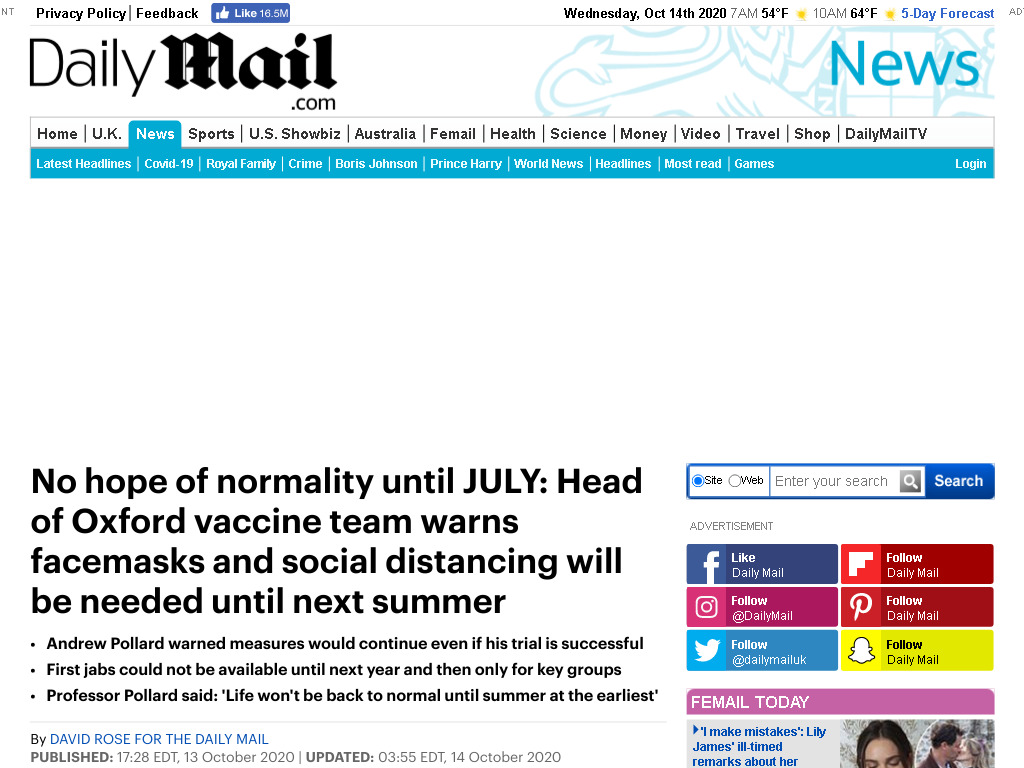Facemasks and social distancing will be needed until next summer, the head of Oxford's vaccine trial team said last night.
Andrew Pollard warned strict rules would have to be followed even if global tests proved successful. He said the first jabs would probably not be available until next year – and then only for key groups such as frontline health workers.
Professor Pollard said that he hoped the final trials could be completed by the end of this year but added: 'Life won't be back to normal until summer at the earliest. We may need masks until July.
If we end up with a vaccine that's effective in preventing the disease, that is by far the best way to control the virus. But in the medium term, we'll still need better treatments. When does life get back to normal? Even if we had enough vaccine for everyone, in my view it's unlikely that we're going to very rapidly be in a position where the physical distancing rules can be just dropped.
'Until we've got a high level of immunity in the population so that we can stop the virus so most vulnerable people are immune, there is going to be a risk. Initially, we're going to be in a position where mask-wearing and social distancing don't change.
'Only when there is a big drop in serious cases will governments feel able to relax these measures. This is a very easily transmissible virus.'
The Oxford University vaccine, produced with drugs giant Astrazeneca, is one of only nine to have reached phase three trials, the final stage before implementation, and is widely seen as the leading candidate to deliver.
In his remarks to an online seminar with Oxford alumni, Professor Pollard explained that, if successful, the vaccine will need approval from the Medicines and Healthcare products Regulatory Agency.
He said: 'Once we have the trial results, I can't imagine they will do that overnight.
'They will have to scrutinise the data very carefully – the public would not expect any less.'
The final evaluation, he said, is likely to take weeks, even though he and his team have begun a 'rolling programme' to give the regulatory agency access to the trials while in progress.
Rolling out the vaccine will pose a 'huge logistical challenge', the professor pointed out.
In his remarks to an online seminar with Oxford alumni, Professor Pollard explained that, if successful, the vaccine will need approval from the Medicines and Healthcare products Regulatory Agency.
He said: 'Once we have the trial results, I can't imagine they will do that overnight.
'They will have to scrutinise the data very carefully – the public would not expect any less.'
The final evaluation, he said, is likely to take weeks, even though he and his team have begun a 'rolling programme' to give the regulatory agency access to the trials while in progress.
Rolling out the vaccine will pose a 'huge logistical challenge', the professor pointed out.
Oxford's vaccine is based on a genetically engineered type of coronavirus that gives chimpanzees a form of the common cold.
Trials of the jab involve 20,000 volunteers in Britain and other countries being given either the vaccine or a harmless placebo.
Professor Pollard said early results had shown that the vaccine causes the body to make antibodies against Covid, and that these last for at least three months.
Tests on volunteers given the jab in April will soon show whether they lasted for six months. 'The evidence so far in the lab is that the antibodies are able to stop the virus in its tracks,' said Professor Pollard.
At least one person in the trial has become seriously ill, and has had to be hospitalised with the disease, he added.
Kate Bingham, head of the UK Vaccine Taskforce, said there was only a 'slim' chance the Oxford jab could be ready by Christmas.
She said she felt optimistic from the data seen so far in trials. But she warned against assuming a Covid-19 vaccine would be better than flu jabs, which are only around 50 per cent effective.
'It's most likely that it'll be next year,' she added.



I wouldn’t use New Zealand as an example it’s way easier to keep a virus out of an isolated island country with a small population.
This shit has nothing to do with population density or travel.
New Zealand did what Vietnam did, what Korea did, what Japan did, what China did.
An aggressive fucking lockdown, early, a mask mandate, thorough contact tracing, targeted and mass testing (easy and free), and took care of people that had to stay home.
It wasn't complicated, it's just basic pandemic science. And being an island doesn't fucking help. Ask the UK. Speaking of which, that's where New Zealand got its recent cases from, idiotic fucking Anglos who traveled while they were sick because they didn't want to cancel their vacation. And New Zealand went back into lockdown after just those cases!
Other countries fucked this up, badly.
The US had every advantage going for it, and we still fucked it up. And our lockdown was working, until they realized paying people to stay home meant it was impossible to force them to come back to work while the pandemic was ongoing, and the line demanded they return.
It is 100% policy based. Geography doesn't have shit to do with it.
Korea and Japan really never did an aggressive lockdown like China though. I mean they implemented social distancing and restrictions on crowds and closed schools but most business stayed open. The key to those countries was the testing, tracing, and isolation systems they put in place.
Japan’s testing and isolation was ass.
It’s honestly an enigma how it did as well as it did. Mask wearing, maybe? Or maybe just faking the numbers.
deleted by creator
ngl abe/suga definitely fudged the numbers. theyre still not even that great imo, just the huge fuckup by the anglosphere/eu makes it look good in comparison. the ldp was practically frothing at the mouth to make sure the olympics happened.
There are theories that they might have some cross immunity from other viruses but in this age I’m not sure why they would have them and the average person in the US or EU wouldn’t
new zealand never had a mask mandate except on public transport and even then only in auckland. from talking with my friends back there, no one was really social distancing hugely anyway - new zealand was very lucky. like just before auckland went into lockdown 2 electric boogaloo people were crowding over the fucking beaches bro, anglo brainworms are too strong.
Is South Korea good comparison? It's a densely populated neolib hellhole and they manage to contain the virus pretty well.
I think you can also call it an island nation. It is bordered entirely by sea except for the DPRK which you can disregard for any significant travel.
Yeah that’s a good point, the only way in/out of South Korea is via a select few (like 2-3) airports.
Yeah probably. Any EU country or the US could have done what they did.
Island regions generally speaking have fared well. British Columbia recently clocked in at having the most infections per capita in Canada but almost all the infections are on the mainland. Vancouver Island measures new cases in single digits and has had only 235 confirmed cases total all year.